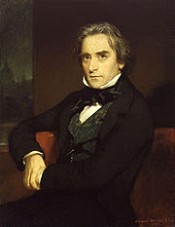Jerrold Douglas William

Douglas William Jerrold (3 January 1803 – 8 June 1857) was an English dramatist and writer. Jerrold was born in London. His father, Samuel Jerrold, was an actor and lessee of the little theatre of Wilsby near Cranbrook in Kent; but in 1807 he moved to Sheerness. There, Douglas spent his boyhood. He occasionally took a child part on the stage, but his father's profession held little attraction for him. In December 1813 he joined the guardship Namur, where he had Jane Austen's brother Francis as captain, and served as a midshipman until the peace of 1815. He saw nothing of the war save a number of wounded soldiers from Waterloo, but he retained an affection for the sea. The peace of 1815 ruined Jerrold's father; on 1 January 1816 he took his family to London, where Douglas began work as a printer's apprentice, and in 1819 he became a compositor in the printing-office of the Sunday Monitor. Several short papers and copies of verses by him had already appeared in the sixpenny magazines, and a criticism of the opera Der Freischütz was admired by the editor, who requested further contributions. Thus Jerrold became a professional journalist. In 1821, a comedy that Jerrold had written at the age of fourteen was brought out at Sadler's Wells theatre under the title More Frightened than Hurt. Other plays followed, and in 1825 he was employed for a few pounds weekly to produce dramas and farces to order for Davidge of the Coburg theatre. In the autumn of 1824, the "little Shakespeare in a camlet cloak", as he was nicknamed, married Mary Swan and continued to work as both dramatist and journalist. For a short while he was part proprietor of a small Sunday newspaper. In 1822, through a quarrel with the exacting Davidge, Jerrold left for Coburg. In 1829, a three-act melodrama about corrupt personnel and press gangs of the Navy launched his fame. Black-Eyed Susan; or, All in the Downs, was brought out by manager Robert William Elliston at the Surrey Theatre. Britain at the time was recovering from the fallout of the Napoleonic Wars, and was in the midst of a class war involving the Corn laws, and a reform movement, which resulted in the Reform Act of 1832 aimed at reducing corruption. Black-Eyed Susan consisted of various extreme stereotypes representing the forces of good, evil, the innocent and the corrupt, the poor and the rich, woven into a serious plot with comic sub-plots to keep the audience entertained. Its subject was very topical and its success was enormous. It took the town by storm, and all London crossed the river to see it. Elliston made a fortune from the piece; TP Cooke, who played William, made his reputation; Jerrold received about £60 and was engaged as dramatic author at five pounds a week, but his reputation as a dramatist was established. It was proposed in 1830 that he should adapt something from the French language for Drury Lane. He declined, preferring to produce original work. The Bride of Ludgate (8 December 1832) was the first of a number of his plays produced at Drury Lane. The other patent houses also threw their doors open to him (the Adelphi had already done so); and in 1836 Jerrold became the manager of the Strand Theatre with WJ Hammond, his brother-in-law. The venture was not successful, and the partnership was dissolved. While it lasted, Jerrold wrote his only tragedy, The Painter of Ghent, and himself appeared in the title role, without much success. He continued to write sparkling comedies until 1854, the date of his last piece, The Heart of Gold. Meanwhile he was writing for numerous periodicals, and gradually became a contributor to the Monthly Magazine, Blackwood's, the New Monthly, and the Athenaeum. To Punch, the publication which of all others is associated with his name, he contributed from its second number in 1841 until within a few days of his death. Punch was a humorous and liberal publication. Jerrold's liberal and radical perspective was portrayed in the magazine under the pseudonym 'Q', which used satire to attack institutions of the day. Punch was also the forum in which he published in the 1840s his comic series Mrs Caudle's Curtain Lectures, which was later published in book form. He founded and edited for some time, with indifferent success, the Illuminated Magazine, Jerrold's Shilling Magazine, and Douglas Jerrold's Weekly Newspaper; and under his editorship Lloyd's Weekly Newspaper rose from almost nonentity to a circulation of 582,000. The history of his later years is little more than a catalogue of his literary productions, interrupted now and again by brief visits to the Continent or to the country. Douglas Jerrold died at his house, Kilburn Priory, in London on the 8 June 1857. Later that month Charles Dickens gave a public reading to raise money for his widow.[1] Jerrold's figure was small and spare, and in later years bowed almost to deformity. His features were strongly marked and expressive, from the thin humorous lips to the keen blue eyes, gleaming from beneath the shaggy eyebrows. He was brisk and active, with the careless bluffness of a sailor. Open and sincere, he concealed neither his anger nor his pleasure; to his sailor's frankness all polite duplicity was distasteful. The cynical side of his nature he kept for his writings; in private life his hand was always open. In politics Jerrold was a Liberal, and he gave eager sympathy to Lajos Kossuth, Giuseppe Mazzini and Louis Blanc. In social politics especially he took an eager part; he never tired of declaiming against the horrors of war, the luxury of bishops, or the iniquity of capital punishment. Douglas Jerrold is now perhaps better known from his reputation as a brilliant wit in conversation than from his writings. As a dramatist he was very popular, though his plays have not seen the stage. He dealt with rather humbler forms of social world than had commonly been represented on the boards. He was one of the first and certainly one of the most successful of the men who in defense of the native English drama endeavoured to stem the tide of translation from the French, which threatened early in the 19th century to drown original native talent. His skill in construction and his mastery of epigram and brilliant dialogue are well exemplified in his comedy, Time Works Wonders (Haymarket, 26 April 1845). The tales and sketches which form the bulk of Jerrold's collected works vary much in skill and interest; but, although there are evident traces of their having been composed from week to week, they are always marked by keen satirical observation and pungent wit. Among the best known of his numerous works are: See his eldest son William Blanchard Jerrold's Life and Remains of Douglas Jerrold (1859). A collected edition of his writings appeared between 1851–54, and The Works of Douglas Jerrold, with a memoir by his son, W. B. Jerrold, in 1863–64, but neither is complete. The first article of the first issue of the Atlantic Monthly (November 1857) is a lengthy obituary for Jerrold. Among the numerous selections from his tales and witticisms are two edited by his grandson, Walter Jerrold, Bons Mots of Charles Dickens and Douglas Jerrold (new ed. 1904), and The Essays of Douglas Jerrold (1903), illustrated by H. M. Brock. See also The Wit and Opinions of Douglas Jerrold (1858), edited by WB Jerrold.
do you like this author?
What readers are saying
What do you think? Write your own comment on this book!
write a commentWhat readers are saying
What do you think? Write your own comment on this author!
write a commentBook list

the housekeeper or the white rose a comedy in two acts
Series:
Unknown
Year:
Unknown
Raiting:
4/5
Show more
add to favoritesadd In favorites
Book list

the housekeeper or the white rose a comedy in two acts
Series:
Unknown
Year:
Unknown
Raiting:
4/5
Show more
add to favoritesadd In favorites

the chronicles of clovernook with some account of the hermit of bellyfulle
Series:
Unknown
Year:
Unknown
Raiting:
4.5/5
Show more
add to favoritesadd In favorites

the barbers chair and the hedgehog letters
Series:
Unknown
Year:
Unknown
Raiting:
3/5
Due to the very old age and scarcity of this book, many of the pages may be hard to read due to the blurring of the original text.
Show more
add to favoritesadd In favorites

st giles and st james
Series:
Unknown
Year:
Unknown
Raiting:
3/5
This scarce antiquarian book is included in our special Legacy Reprint Series. In the interest of creating a more extensive selection of rare historical book reprints, we have chosen to reproduce this title even though it may possibly have occasional imperfections such as missing and blurred pages, missing text, poor pictures, markings, dark backgrounds and other reproduction issues beyond our control. Because this work is culturally important, we have made it available as a part of our commitment to protecting, preserving and promoting the world's literature. --This text refers to the Paperback edition.
Show more
add to favoritesadd In favorites

specimens of douglas jerrolds wit together with selections chiefly from his c
Series:
Unknown
Year:
Unknown
Raiting:
4/5
Show more
add to favoritesadd In favorites

punchs letters to his son and punchs complete letter writer
Series:
Unknown
Year:
Unknown
Raiting:
4.5/5
Show more
add to favoritesadd In favorites

nell gwynne or the prologue a comedy in two acts
Series:
Unknown
Year:
Unknown
Raiting:
3.5/5
This scarce antiquarian book is included in our special Legacy Reprint Series. In the interest of creating a more extensive selection of rare historical book reprints, we have chosen to reproduce this title even though it may possibly have occasional imperfections such as missing and blurred pages, missing text, poor pictures, markings, dark backgrounds and other reproduction issues beyond our control. Because this work is culturally important, we have made it available as a part of our commitment to protecting, preserving and promoting the world's literature. --This text refers to the Paperback edition.
Show more
add to favoritesadd In favorites

fifteen years of a drunkards life a melodrama in three acts
Series:
Unknown
Year:
Unknown
Raiting:
4/5
Show more
add to favoritesadd In favorites

comedies
Series:
Unknown
Year:
Unknown
Raiting:
3.5/5
Originally published in 1854. This volume from the Cornell University Library's print collections was scanned on an APT BookScan and converted to JPG 2000 format by Kirtas Technologies. All titles scanned cover to cover and pages may include marks notations and other marginalia present in the original volume.
Show more
add to favoritesadd In favorites

cakes and ale
Series:
Unknown
Year:
Unknown
Raiting:
4/5
Purchase of this book includes free trial access to www.million-books.com where you can read more than a million books for free. This is an OCR edition with typos. Excerpt from book: THE MAYOR OF HOLE-CUM-CORNER. " And pray, sir, in what reign did this happen ? " asked a modern master of the dramatic robes, when required to furnish dresses for the valorous Saint George and his companions. " Reign ! " echoed the master of the revels, with a laughing, wondering look " Reign ! " " Yes, sir : as it has ever been with me a point of reputation to attend to the minutest details of historical costume, I am desirous of learning the reign in which Saint George fought the dragon, in order that you perceive, sir fidelity in these matters " - " Let's look at the rags," interrupted the master of the forthcoming pageant ; " and, ha ! ha ! never mind the reign ! " We narrate this little anecdote, in the hope that it may serve at once as preface and apology to the legend we are about to recount a legend to which we are totally unable to ascribe a date, and for which questionable advantage we earnestly trust the reader cares no more than the master of the revels above cited, in the more important case of our national saint. The trials of Tobias, albeit unsung, unsaid, may be no less true than the victories of Saint George, who still slays his dragon on sovereigns and crown-pieces, and thereby affords to the least imaginative of her Majesty's subjects a consolatory assurance, that he who possesses many records of his glory is, in proportion to the number possessed, charmed from the assaults of many ills; whilst the trials of Tobias, though probably of high moral value, may not so unequivocally manifest their sterling worth. Notwithstanding this conviction, we are induced to bring our hero on the page, confessing that the time of his life and acts is equally uncertain as the date of the knight of fairyland, and hoping to meet with readers to whom it is e...
Show more
add to favoritesadd In favorites

a man made of money and the chronicles of clovernook
Series:
Unknown
Year:
Unknown
Raiting:
3/5
Show more
add to favoritesadd In favorites

Mrs. Caudle's Curtain Lectures
Series:
Unknown
Year:
Unknown
Raiting:
4/5
By Douglas William Jerrold, an English author, playwright and journalist of the 19th century. For some time he worked for Punch magazine, where his “Mrs. Caudle's Curtain Lectur” saw the light of the day in 1846. The book relates a hen-pecked husband, compelled to lie and listen to his wife’s shrewish sermons. Jerrold portrays the Victorian middle class culture in an amusing, humorous way.
Show more
add to favoritesadd In favorites
What readers are saying
What do you think? Write your own comment on this author!
write a commentif you like Jerrold Douglas William try:
readers also enjoyed
What readers are saying
What do you think? Write your own comment on this author!
write a commentGenre
if you like Jerrold Douglas William try:
readers also enjoyed
Do you want to exchange books? It’s EASY!
Get registered and find other users who want to give their favourite books to good hands!

